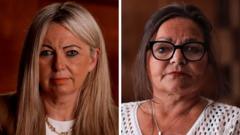Could a 1980s Sex Attack Suspect Finally Face Justice After Recent BBC Inquiry?

Unveiling a Dark Chapter: The Allegations of Sexual Assault in Dumfries
The tragic stories of four women who allege they were victims of sexual assault or rape by the same man in Dumfries during the 1980s and 90s have resurfaced, revealing systemic failures in how such cases have been handled over the decades. The allegations, first reported two decades ago, have taken on new life following a recent investigation by the BBC. This article delves into the harrowing accounts of the survivors, the legal complexities they faced, and the urgent conversation surrounding the prosecution of sexual offenses.
The Allegations: A Timeline of Fear and Silence
The alleged assaults reportedly took place over an 11-year period, with the women involved ranging from teenagers to young adults at the time. One victim, who was just 15 years old, has come forward to share her experience for the first time. The BBC’s investigation, titled "The Rapist In Our Town," has prompted renewed scrutiny of the police's handling of these cases and the legal system's response to sexual offenses.
The Victims’ Accounts
Each survivor's story is a painful reminder of the trauma they endured and the societal pressures that led them to remain silent for years.
Fiona's Story
At the age of 18, Fiona was enjoying a night out in Dumfries when she was lured to a stranger's home. What started as a seemingly innocent encounter quickly turned into a nightmare. Fiona recounted, "He had me pinned down with one arm. I kept saying to him: 'No, no, no'. But he didn't stop." After the assault, the perpetrator brazenly remarked, "I suppose you'll say I've raped you now." This statement encapsulated the chilling reality many victims face: the disbelief and shame that often accompany such traumatic experiences.
Fee's Experience
Fee’s encounter occurred in 1984 when she was working in a local bar. After being followed upstairs, she was attacked by the same man Fiona described. "I kept fighting with him and telling him to stop," she recalled. Her bravery in resisting the assault is noteworthy, and her decision to remain silent for years underscores the fear of not being believed.
Caroline’s Assault
Caroline shared her story of an assault that took place in 1982, when she was using a phone booth. The familiarity she had with her attacker made the incident even more shocking. "He literally had got me up against the wall," she recounted, emphasizing the betrayal of trust that often accompanies such attacks.
The Youngest Victim
The most heartbreaking account comes from a woman who was just 15 years old when she was raped in 1993. She has kept her story secret for over three decades, only now feeling ready to speak out. Her assertion, "I've come to realize it's not my fault. I didn’t do anything wrong," highlights the critical importance of empowering survivors to reclaim their narratives.
The Legal Landscape: A History of Injustice
The stories of these women have not only illuminated their personal struggles but also raised serious questions about the legal system's treatment of sexual assault cases. Despite the women's attempts to report their experiences to the police, the initial investigations were ultimately deemed insufficient to proceed to court. In Fiona's case, a letter from the man’s lawyers threatening defamation pushed her to take action and report the assault to the police.
Police Investigations and Legal Challenges
In 2007, after a police investigation, the procurator fiscal informed the women that their case would not proceed due to "insufficient evidence." This decision left the victims feeling frustrated and disillusioned. The lack of follow-up on additional leads, including potential witnesses, further compounded their sense of abandonment by the justice system.
Reopening the Case
In November 2022, Fiona approached the police again, urging them to reopen the case. Her determination to seek justice for herself and for other potential victims exemplifies the resilience that many survivors demonstrate. The BBC’s investigation, which began in April 2023, played a crucial role in uncovering new leads and encouraging additional victims to come forward.
Systemic Failures: The Need for Reform
The experiences of these women reveal a troubling pattern of systemic failures. The reluctance of victims to come forward, compounded by a lack of trust in law enforcement and legal systems, poses significant barriers to justice. The emotional toll on survivors is exacerbated by the fear of not being believed or taken seriously, leading many to suffer in silence.
Understanding the Impact of Sexual Offenses
Sexual offenses have a profound and lasting impact on victims. The trauma experienced can lead to mental health struggles, including anxiety, depression, and post-traumatic stress disorder (PTSD). As these women have shared their stories, it serves as a reminder of the importance of providing support for victims and creating an environment where they feel safe to disclose their experiences.
Moving Forward: The Role of Society and Legal Reforms
The tragic accounts of these women call for urgent reforms within the justice system. It is essential for law enforcement agencies to prioritize the investigation of sexual offenses and provide adequate support for survivors. Training for police officers on handling such cases sensitively and effectively can help bridge the gap between victims and the legal system.
Advocacy and Support Services
Survivors of sexual assault need access to comprehensive support services, including counseling, legal assistance, and advocacy. These resources can help victims navigate the complexities of the legal system while ensuring their emotional and psychological needs are met.
Community Awareness and Education
Raising community awareness about sexual violence is crucial. Educational programs that address consent, healthy relationships, and the rights of victims can empower individuals to speak out against such crimes and support those who have been affected.
Conclusion: The Call for Justice
The stories of Fiona, Fee, Caroline, and the anonymous young victim are not just individual accounts; they reflect a broader societal issue that demands attention. The recent arrest of the alleged perpetrator is a step towards justice, but it also serves as a reminder of the long and painful journey many survivors face in seeking accountability.
As we reflect on these harrowing narratives, we must continue to advocate for change within our legal and social systems. The voices of survivors must be amplified, and their experiences validated. Only through collective action can we hope to create a safer environment for all.
FAQs
What should I do if I or someone I know has been a victim of sexual assault?
If you or someone you know has experienced sexual assault, it is crucial to seek help. You can contact local law enforcement or reach out to support organizations that specialize in assisting survivors of sexual violence.
How can survivors find support after an assault?
Survivors can find support through counseling services, hotlines, and advocacy groups that provide resources and emotional assistance. These organizations can help navigate the legal process and offer a safe space to discuss experiences.
What legal options do survivors have when pursuing justice?
Survivors have various legal options, including reporting the assault to law enforcement, seeking a protective order, and pursuing civil litigation against the perpetrator. It is advisable for survivors to consult with legal professionals who specialize in sexual assault cases.
As we reflect on these accounts, how can we as a society better support survivors and combat sexual violence? #JusticeForSurvivors #EndSexualViolence #SupportSurvivors
Published: 2025-06-25 16:04:08 | Category: technology



